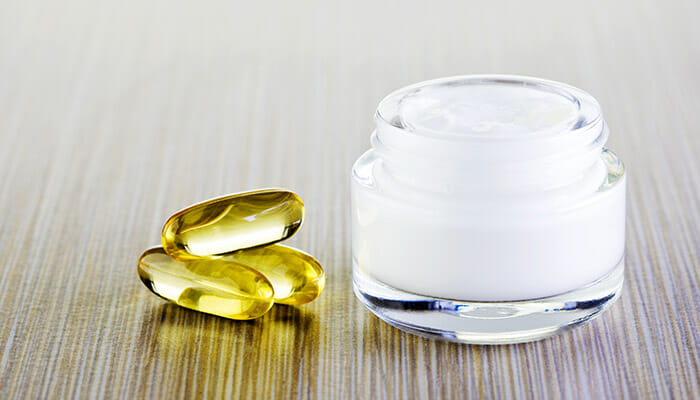The Most Popular Ingredient in Personal Care: Vitamin E
Vitamin E has become a popular ingredient in the Personal Care industry, appearing in many dermatological products for its antioxidant properties. It has become one of the most common ingredients out there and offers many health benefits.
Vitamin E is essential for healthy skin and helpful for skin repair and a range of skin disorders. It helps with cellular restoration from a variety of skin damage, preventing oxidative damage to cells by helping remove free radicals. Free radicals are destructive to skin. Vitamin E also is moisturizing, healing and anti-inflammatory.
Vitamin E refers to a group of compounds and is the name for a family of oil-soluble antioxidants. According to cosmetic chemist Ni’Kita Wilson, there are eight different forms of Vitamin E, with tocopheryl acetate and tocopherol as the most common in skin-care products. Tocopherol is the only form of Vitamin E that’s recognized to meet human requirements, according to the National Institutes of Health (NIH).
Vitamin E’s stability in products depends on its form, with dl-α-Toc acetate being the most stable. As the ingredient occurs naturally in food, it slowly oxidizes when exposed to air. Even as many skincare brands and cosmeceuticals contain Vitamin E, they’re ineffective if the ingredient is unstable once exposed to air and light. In order for Vitamin E to be an effective skin care treatment, this oxidation process needs to slow down or stop so that the consumer can absorb its benefits through the skin.
According to the academic medical journal Indian Dermatology, Vitamin E’s stability may be increased by Vitamin E conjugates, which are esters of tocopherol and resistant to oxidation while still able to penetrate skin layers.
The key to creating a stable formulation of Vitamin E that provides health benefits through topical application is delivering a product with a high concentration of nonesterified, optimal isomer of Vitamin E. Nonesterified Vitamin E is natural and occurs free, rather than esterified and put through an extra process with glycerol to form a glyceride or other lipid. Naturally occurring Vitamin E is also different than synthetic Vitamin E as the synthetic version is a mixture of eight isomeric forms, usually labeled “all-rac” or “dl.”
At Market Acceleration Group (MAG), we offer natural Vitamin E, perfect for Personal Care product formulations. MAG has the quickest response times, reliable deliveries and a team of knowledgeable technical sales specialists all with degrees in the chemical field. Contact us directly at info@barentzma.com to request a sample of natural Vitamin E for your personal care product line, and let’s start a conversation today.
